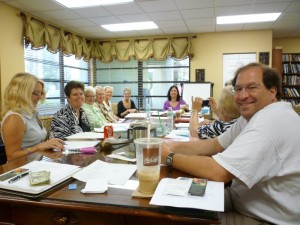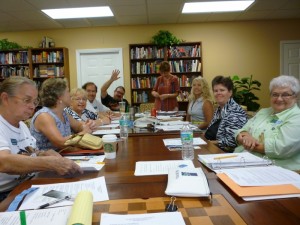Nancy J. Cohen
This past weekend, I had the privilege of speaking to the Southwest Florida Romance Writers in Estero, Florida. Up to 25 members were present when I spoke about Social Networking for Writers and passed around my eight-page handout. We could have discussed this topic for a lot longer than the allotted hour, but our time ended and I left for home.
On the drive back to the east coast, I reflected on how a speaker really has to gear her talk to the audience. Speaking to a bunch of writers is a lot different than giving a talk to a roomful of fans. Readers in general are eager to hear how you got published, where you get your ideas, what you researched for your story, and if you make a living at what you do. Don’t ask me why, but that question always arises. Would you ask a lecturer how much money he makes?
You’re expected to be witty and entertaining and to use anecdotes in your talk. I like to educate the public on the realities of the publishing business, so I’ll talk about the impact of the digital era, choices for writers today, and what readers can do to help authors in terms of customer reviews, Liking our pages, sharing our posts, etc. Lay persons find this information to be fascinating. Sure, I’ll talk about my books but mainly as an overview about my series and some of my research experiences. I don’t believe in doing readings or a book review on a specific title. There’s nothing more boring, IMHO, as an author’s droning voice as he reads from his own work. It’s more exciting to talk off the cuff about the publishing world and what fuels my stories.
In contrast, when speaking to fellow writers, I aim to teach. I want to get points across that they can take home and use in their own work. Motivational talks uplift and inspire writers to keep plowing ahead despite the setbacks that we all experience in this career. I’d rather give practical tips, how-to details, and specific instructions. Handouts accompany all of my workshops. This is not necessarily the case if I’m on a panel, however. Then it’s much harder to get across a lot of information because you’re sharing the time and stage. It’s good to come prepared with a few pointers regardless, and handouts are still appreciated, but having one hour to myself is best for in-depth instruction.
I’ve attended panels at writers conferences where the authors prattle on about their work, and attendees leave the room having been entertained but learning nothing new. I don’t care to attend those types of sessions myself. I’d rather go to a workshop where I can gain new insights or tips on a specific aspect of writing or marketing. Anybody can talk about himself. How many can teach in a meaningful, clear manner? Those who can’t teach will do very well speaking on panels at fan conventions, libraries and community groups.
Where am I going with this? If you have a speaking engagement coming up, consider your audience. If it’s a bunch of fans/readers, talk about your books, the publishing world, where you get your ideas, the writing process. If it’s a group of writers, target your material so they can take away something worthwhile.
If you’re a reader, what do you like to hear when you go to see an author? If you’re a writer, do you differentiate how you approach each audience?



